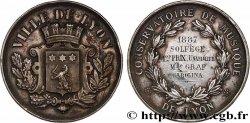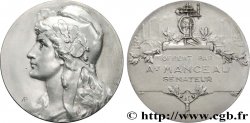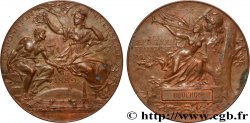fme_446077 - III REPUBLIC Médaille offerte par le sénateur René Coty
Not available.
Item sold on our e-shop (2021)
Price : 75.00 €
Item sold on our e-shop (2021)
Price : 75.00 €
Type : Médaille offerte par le sénateur René Coty
Date: n.d.
Mint name / Town : 76 - Rouen
Metal : bronze
Diameter : 68,95 mm
Orientation dies : 12 h.
Engraver DUPUIS Daniel (1849-1899) - DUBOIS Henri (1859-1943)
Weight : 147,9 g.
Edge : lisse + corne BRONZE
Puncheon : corne BRONZE
Coments on the condition:
Superbe médaille avec une belle patine brune
Obverse
Obverse legend : RÉPUBLIQUE - FRANÇAISE.
Obverse description : Buste de Marianne de profil à droite avec une couronne de laurier et chêne dans la chevelure..
Reverse
Reverse legend : OFFERT / PAR / M. RENE COTY / SENATEUR.
Reverse description : Légende en 4 lignes dans un médaillon, dans une couronne de chêne et de lauriers..
Commentary
René Coty, né le 20 mars 1882 au Havre et mort le 22 novembre 1962 dans la même ville, est un homme d'État français, président de la République française de 1954 à 1959.
Député de la Seine-Inférieure de 1923 à 1935 puis de 1945 à 1948, sénateur de la Seine-Inférieure de 1936 à 1944 puis de 1948 à 1953, il occupa les fonctions de ministre de la Reconstruction et de l'Urbanisme, de 1947 à 1948 dans le cabinet de Robert Schuman puis d'André Marie, il devient ensuite vice-président du Conseil de la République jusqu'en décembre 1953, date à laquelle il est élu à la présidence de la République, au 13e tour de scrutin.
Son mandat est marqué par le gouvernement de Pierre Mendès France, la fin de la guerre d'Indochine, le début de la guerre d'Algérie et le retour du général de Gaulle au pouvoir, qui entraîna la fondation de la Ve République et son départ volontaire, en janvier 1959 de la présidence de la République pour laisser place à de Gaulle, « le plus illustre des Français », comme l'appelait le président Coty.
René Coty est le second et dernier président de la IVe République.
Cette représentation de Daniel Dupuis n’est pas sans rappeler ses monnaies de 1, 2, 5 et 10 centimes, avec le bonnet phrygien !..
Député de la Seine-Inférieure de 1923 à 1935 puis de 1945 à 1948, sénateur de la Seine-Inférieure de 1936 à 1944 puis de 1948 à 1953, il occupa les fonctions de ministre de la Reconstruction et de l'Urbanisme, de 1947 à 1948 dans le cabinet de Robert Schuman puis d'André Marie, il devient ensuite vice-président du Conseil de la République jusqu'en décembre 1953, date à laquelle il est élu à la présidence de la République, au 13e tour de scrutin.
Son mandat est marqué par le gouvernement de Pierre Mendès France, la fin de la guerre d'Indochine, le début de la guerre d'Algérie et le retour du général de Gaulle au pouvoir, qui entraîna la fondation de la Ve République et son départ volontaire, en janvier 1959 de la présidence de la République pour laisser place à de Gaulle, « le plus illustre des Français », comme l'appelait le président Coty.
René Coty est le second et dernier président de la IVe République.
Cette représentation de Daniel Dupuis n’est pas sans rappeler ses monnaies de 1, 2, 5 et 10 centimes, avec le bonnet phrygien !..








 Report a mistake
Report a mistake Print the page
Print the page Share my selection
Share my selection Ask a question
Ask a question Consign / sell
Consign / sell
 Full data
Full data



